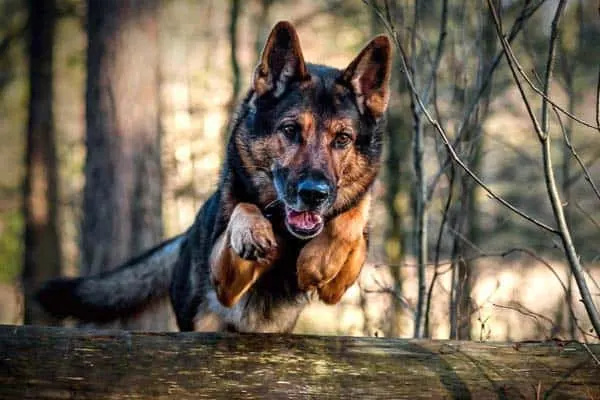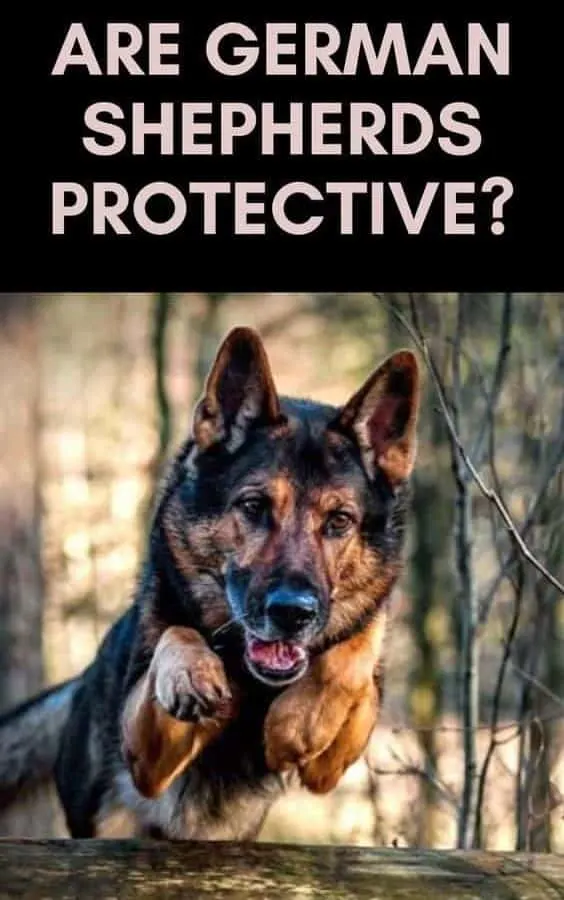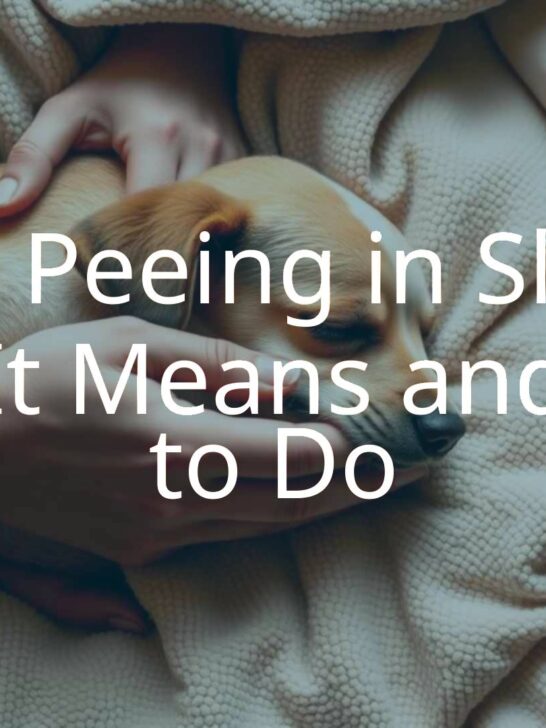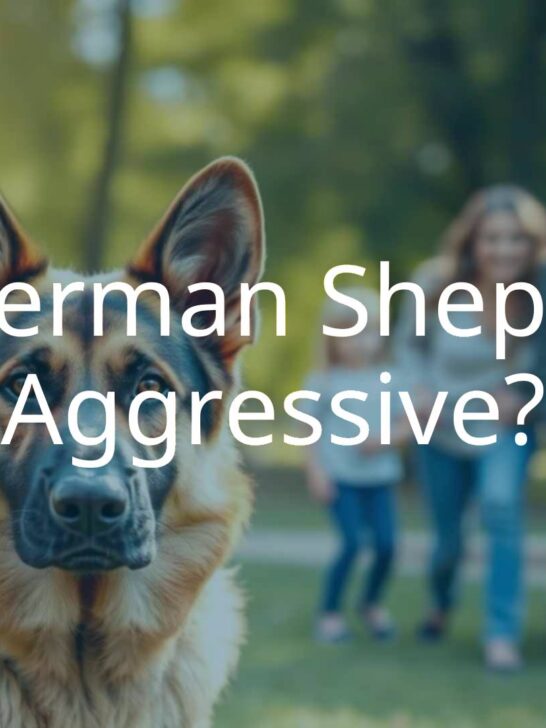Are German Shepherds Protective? Accepting GSD’s Protective Instincts
German Shepherds are among the most widely-adopted dog breeds in the world. In fact, the AKC ranks them as the second most popular – just behind the Labrador Retriever.
Families love them for their protective attitudes, unwavering loyalty, and seemingly endless energy. But are German Shepherds protective? And if so, to what extent?
A dog can be loyal but it doesn’t mean he has the protective instincts to be a true protector and defend you at any cost.
In this guide, we’ll look at traditional characteristics of German Shepherds and how – in the right households – they can be remarkably supportive and protective.

Common Personality Traits of German Shepherds
If someone asked you to name the most loyal dog breed, there’s no question German Shepherds come to mind.
Families with German Shepherds often tout their supportive attitudes, making them one of the most fun dog breeds.
They’re also intelligent and easy-to-train. Alongside their loyalty, these traits make them exceptional all-around service dogs.
You can train a German Shepherd for nearly anything – with enough persistence, these dogs can learn impressive tricks, including protective behaviors.
German Shepherds are naturally alert. Unfamiliar noises will wake them up immediately, and GSDs will be naturally suspicious around unfamiliar people.
If you’re looking for a dog breed that will wake up in the middle of the night to ward off intruders or bark at trespassers on your property, the German Shepherd could be the right breed for you.
It’s important to realize these traits come with one big characteristic you need to consider: German Shepherds need a lot of physical activity to manage their naturally-alert states.
Unlike an English Bulldog who enjoys sleeping on the couch most of the day, a German Shepherd wants to walk, run, and play as much as he or she can.
Above all, German Shepherds are eager to please their owners. If you can find a way to communicate what you want, they will oblige.
Oftentimes, behavioral concerns with German Shepherds stem from a lack of early-puppyhood socialization and inconsistent training.
Proper training and socialization from a young age, as well as rigorous amounts of daily exercise, are highly recommended for GSDs.
When this is done properly, coupled with the German Shepherd’s natural protective instincts, you will have the ultimate protective dog by your side that is ready to defend you and your family at all costs.

Common German Shepherd Physical Characteristics
If you are seeking a large protective dog, a German Shepherd could be the perfect match. These dogs range in size, varying from 24-26 inches tall at the shoulder for males, and 22-24 inches for females.
When you first picture a German Shepherd, you may think of a powerful, agile creature with well-defined muscles and thick hair.
German Shepherds closely resemble their wolf ancestors and their personalities embody their ferocity.
The German Shepherd’s tail is one of its defining characteristics. It’s long and presents itself at a smooth angle, rarely with any kinks or deformities.
Thick, deep-bodied hair defines the tail and gives it its easily-recognizable appearance.
Speaking of the German Shepherd’s hair, be prepared to groom your new canine companion on a regular basis.
They have medium-to-long hair that grows quite thick – if you don’t manage it, your dog’s coat will mat and create painful, hard-to-remove tangles of hair.
Since German Shepherds are usually larger dogs, their physical appearance plays a major role in their ability to be effective protectors.
Naturally, their loyalty and intelligence make them exceptionally protective dogs, but their size gives them a further advantage over other breeds.
Many small breeds are also protective but aren’t as effective due to their smaller size.
You definitely won’t have this issue with German Shepherds – many bloodlines feature very large dogs that can reach upwards of 100lbs.

So, Are German Shepherds The Ideal Protective Dog?
On a scale of “aloof” to “overprotective,” German Shepherds will always fall into the overprotective category.
In fact, without proper training, their protective instincts can be overwhelming for under prepared families.
German Shepherds are eager to please their owners and as such, want to protect their pack. They will bark at intruders, defend their territory, and ward off potential threats until the threat is neutralized.
German Shepherds are incredibly brave and they won’t back down from a challenge until they know their families are safe.
On the other hand, this can present issues in some circumstances. A German Shepherd’s protective attitude can make them somewhat aggressive if you don’t train them properly.
Also, destructive and aggressive behaviors will develop if these dogs don’t get the extensive exercise they need on a regular basis.
You need to be mindful of the German Shepherd’s protective mindset when you consider adopting one.
If you aren’t willing to commit to training, you may see their protective traits manifest themselves in the following ways:
- Food aggression
- Aggression toward other dogs
- Aggression toward people or children
- Aggression during play
- Destroying household objects
- Being territorial with other pets (like chasing cats)
- Barking and responding to non-threats
These behavioral issues are also common when owners don’t exercise their German Shepherds enough.
They become frustrated when they don’t get enough exercise, and as a result will act out in destructive ways as this pent up energy needs to be released.
You need to walk a German Shepherd at least one time per day, and most experts recommend giving them at least two hours of exercise on a daily basis.
But don’t let this scare you away from adopting a German Shepherd – by nature, they are highly protective but still make great family companions!
If you’re looking for a breed to protect your family, few will do a better job than the German Shepherd.
Training a German Shepherd to Be Protective
As with any dog breed, a German Shepherd’s behavior and personality will reflect how they’re treated and how they were raised.
If you get a puppy and you socialize him well, train him, and teach him to respect you, you’ll have an excellent family dog that everyone will love.
On the other hand, you need to be careful about nurturing the wrong behaviors. German Shepherd puppies are cute and it can be easy to promote behaviors that should ideally be avoided.
For example, your puppy may reach for a bite of food and if you oblige, you may actually encourage food aggression.
Fortunately, the German Shepherd’s high intelligence makes him easy to train with a little persistence.
If you use the right methods (like those shown in this YouTube video), you can encourage protective behaviors without promoting aggression.
Understand why your dog is acting the way he is if he’s showing undesirable behaviors.
If he’s chewing up your shoes, ask yourself why – is he frustrated because he didn’t get enough exercise? Does he have other toys within reach to play with?
Be aware that negative reinforcement rarely works with German Shepherds.
Your new puppy will learn more quickly if you give him positive feedback for good behaviors than if you give him negative feedback for undesirable behaviors.
It’s important to use redirection and positive reinforcements to train your puppy. Using aggressive or hostile measures won’t help you teach your dog – instead, he or she won’t trust you.
You’ll also re-affirm the bad behaviors if you repeat them – for example, yelling at your dog while he’s barking tells him it’s okay to bark. He may even bark louder after you yell!
If you aren’t sure how to train your German Shepherd puppy, we recommend working with a professional.
After you go to a few lessons, you can learn training tips to use at home. However, it’s important to use the right strategies as early as possible, and doing so through trial-and-error may confuse your dog.
By working with a trainer, you can guarantee your dog is learning through proven methods, and that you should see long-lasting results.
Ultimately, training resources should be a part of your adoption budget if you want a protective German Shepherd. They learn quickly, and you should take advantage of it by using proper training methods.
Working with your dog and using the right training methods will pay off in the end – you will have a fiercely loyal and protective dog who will stop at nothing to protect your family home.
If you don’t properly train your German Shepherd as a puppy, you may need to work through behavioral issues in the future such as aggressive or dominant tendencies.

Are German Shepherds Protective? The Final Verdict
German Shepherds are among the smartest, most popular dogs in the world – and for good reason.
They’re bred to protect their families and show unwavering loyalty, two of the most desirable traits in a dog.
Today, families love German Shepherds for their loyalty and protective instincts. Without hesitation, they will ward off intruders with warning barks and will act – if necessary – to protect their families.
However, the natural tendencies that make GSDs excellent protectors can also make these dogs more susceptible to aggressive and territorial behaviors.
Fortunately, you can mitigate these behaviors with proper training and have the exceptional family protector you’ve always wanted.




















